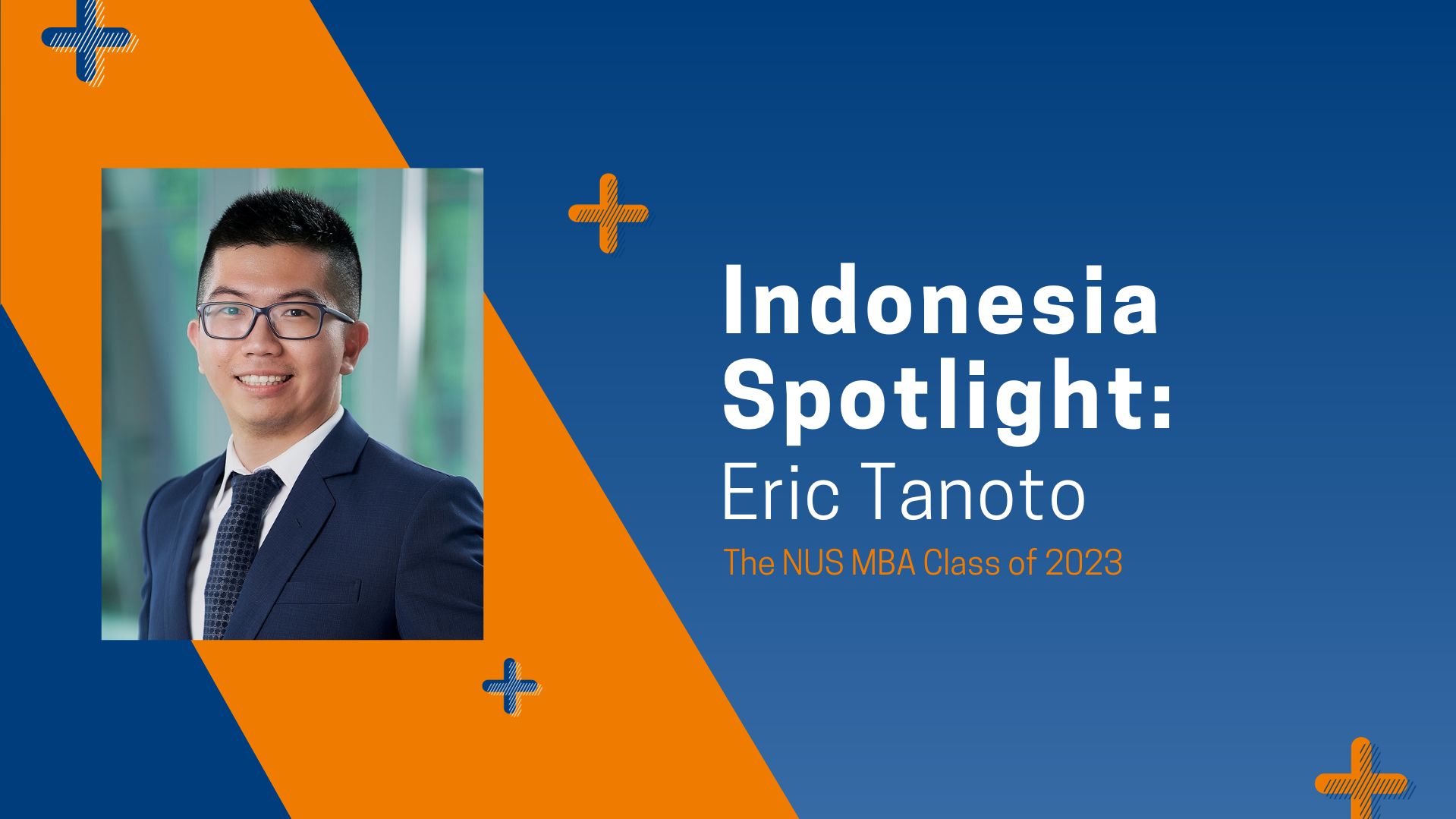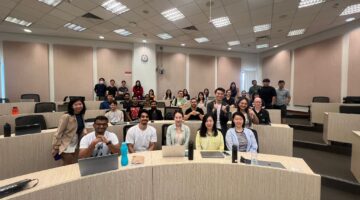NUS MBA Indonesia Spotlight: Eric Tanoto
|
|
Eric Tanoto
|
Describe what you were doing before embarking on your MBA.
I previously worked for Schlumberger, an upstream oil and gas company. My role was a customer engagement coordinator whose focus was on helping energy companies build wells to extract oil, gas, geothermal energy, and carbon underground storage. I loved the exposure of the job, where I spent 6.5 years in Indonesia, worked in the forests of Sumatra and Java before I moved to the Jakarta office, handling well design and meeting with clients. Then I was transferred to Al Khobar, Saudi Arabia, where I worked for around 2.5 years helping Saudi Aramco build even more challenging and complicated wells.
What do you hope to do after you graduate?
I came to the MBA with a hypothesis that I can deliver more impact by upgrading my career into a strategy role within energy sector. Fortunately, I got the opportunity to intern with a consulting company in Singapore that has a strong focus on energy practices, and I find myself liking the dynamics of the consulting role. Hence, I hope I can take on a strategy role within the energy sector, leveraging on my past experience and also building on my knowledge and experience from NUS MBA.
What has your NUS MBA journey been like so far in terms of the resources and opportunities that you’ve taken part in?
The NUS MBA has given me a lot of resources to transform myself and provided many opportunities for me. I always believe that the outcomes are directly proportionate to the effort that I put in. So the more I put my energy to use those resources, the more opportunities I can generate.
First of all, I got to meet many new friends that have become so valuable to my life. They come from a diverse background and I found them to be really inspiring and interesting individuals. Many of them have become very close friends and some of them even managed to come to my wedding in Jakarta last year.
Secondly, from an academic point of view, core courses have helped me build a foundation for business knowledge that I needed, bridging the gap from my engineering undergraduate background. I would like to emphasise a few elective courses that I think you shouldn’t miss on the NUS MBA journey: Technological Disruptions in Finance & Data Analytics by Prof Lee, Digital Marketing by Prof Eugene, and Financial Statement Analysis by Prof Sean Shin Sa-Pyung. In my opinion, these professors are really passionate about teaching, and they provide very structured content packed with insights.
Thirdly, in the NUS MBA Student Club, I was captain of the badminton team, managing weekly practice and player selection with Ka Hyun (Vice President for the NUS MBA Sport & Wellness Club) in preparation for the MBA Olympics. I was so happy because I also made a lot of friends during the process, and NUS won all the medals in the badminton categories. Besides sports, I also joined the NUS MBA Consulting Club, where I got to practise case interviews and help classmates to do the same.
How did the NUS MBA help with your career development?
In the first month of my MBA, I was assigned to my career advisor, Anthea Tan, who helped me to better structure my CV and prepare for a case interview. At the start, I shared that I wanted to pursue a career in a strategy role within energy sector. I think it’s good to know what you wish to pursue, but even if you don’t know that, a career advisor may help to structure and guide you on what could be achievable based on your experience.
My involvement in the NUS MBA Consulting Club enabled me to practise case interviews with my classmates. BIZCareers also provided access to great consulting coaches such as Clarence Ho who provided valuable help in preparing my case interview skills.
With all this support and preparation, I applied to an internship opportunity through the NUS MBA office and successfully managed to clinch the role.
Comparing your current self (post-MBA) to your previous self (pre-MBA), in what ways do you feel that you’ve changed?
Before my MBA, I felt skilled in a specific area, but it seemed like a small part of a bigger picture. I think those from other technical fields might feel the same, curious about what lies outside of their specialty.
After 1+ years of my MBA journey, including attending classes, doing an internship, and meeting new people, I feel like I can understand the bigger picture, in terms of how business works, what factors drive growth and restrain business, and what frameworks can help me better understand the problem. It’s important for me to understand those things because it helps me decide the role I want to be in in the future.
Many MBA aspirants feel that the NUS MBA is academically challenging. What do you think?
I would say it depends on your previous academic background and professional experience. If you have prior experience in finance, I would say you’d be able to gain deeper knowledge by asking questions in class. However, if you come from backgrounds other than finance (like myself), I would say the academic rigour is manageable. In a few cases, I faced some challenges understanding finance-heavy courses, but I’ve been able to rely on my classmates to help me. In return, they’d ask me for help on operations-heavy courses. So, don’t worry too much about it, if an engineer with zero finance background can do it, you can too! 😊
As an Indonesian student/alum, what would be your advice to other Indonesians who are considering the NUS MBA?
To all of my fellow Indonesians, I think the NUS MBA will be a very good option for you if you want to have career in Asia as your long-term goal. You will be able to make new friends, networks, and connections across Asia that will be valuable for your career as well as personal life.
Do you have any tips or advice to share on the application process, or on getting the most out of the NUS MBA experience?
- Prepare for your GMAT early so that you have time to improve on your score if it’s needed.
- Reflect deeply before you write your essays and prepare for the interview, as this will help the admissions team determine whether the programme can help you bridge your current status and your aspirations after MBA.
- Once you get into the NUS MBA, and if you’re able to, go for on-campus housing (typically at UTown Residence) because this will give you the full experience as an NUS student and enable you to enjoy all facilities that support your learning journey.



